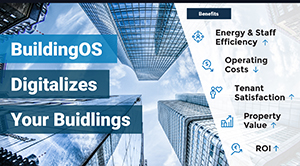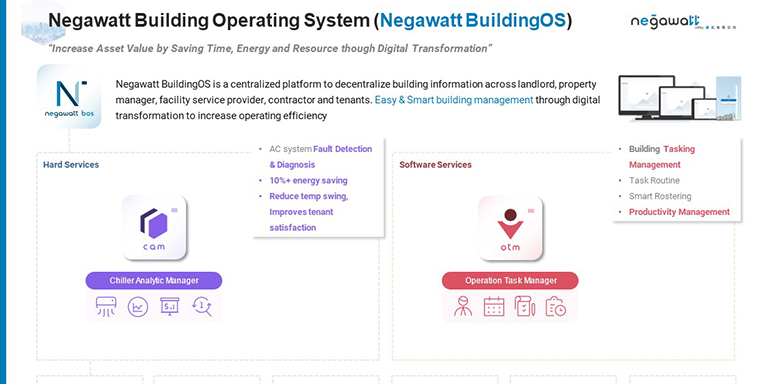
Tot up the costs of any item or service and you quickly find that energy is a key component. Service-economy Hong Kong – known as the “city of lights” and world’s skyscraper capital, a cityscape bathed in an LED glow after sunset and with 355 buildings taller than 150 metres – is no amateur in energy consumption, using 45,000 gigawatt hours in 2019, according to the Census and Statistics Department. That works out at about 17 kilowatt hours per person per day – in line with most Western European countries but just half the consumption in the United States and more than double the average consumption in Mainland China.Much of this power, unsurprisingly in a tropical city, goes into air-conditioning. This concentration of power consumption, population and a thriving technology scene make the city a prime location for energy-focused start-ups.In line with the maxim “a penny saved is a penny earned”, Hong Kong start-up Negawatt Utility believes adapting buildings and systems to minimise energy use – effectively creating “negative watts” – is vital in reducing energy consumption.
Familiar concept

As such, the company’s core product is Negawatt Building Operation System (BOS). “The Negawatt BOS concept is very similar to iOS for Apple phone and Windows for computers,” explained Co-CEO Arthur Lam. “Under the BOS, we have our core proprietary modules or applications to handle different types of building services. We also welcome other technologies to integrate into our BOS platform to enrich user experiences.”The BOS contains a wide range of modules, including the Building Sustainability Management (BSM), Energy & Resource Management (ERM), Chiller Analytic Management (CAM) and Smart Reporting Management (SRM), and Sustainable Immunized Building (SIB) which was recently launched to control indoor environmental quality in view of the COVID-19 pandemic. The system can integrate all modules into an energy dashboard for monitoring and control.In Hong Kong’s massive glass-and-concrete buildings, a leading power eater is air-conditioning, which is Negawatt’s focus.“Over 50% of our clients’ buildings subscribed to our CAM. In layman terms, we perform quick scans of centralised chiller systems to find out if there are any alarming issues. Then based on past data, we can identify and learn the correct and the most energy-efficient settings for the chiller plant under different scenarios with artificial intelligence,” Mr Lam said.“Then we can configure the most efficient setting according to weather forecasts. In general, we save about 8% to 10% of the total electrical bill while maintaining thermal comfort.”Negawatt mainly works on commercial buildings since the owners have an inventive to enhance the value of these investment properties, Mr Lam said.As with any machine-learning system, the BOS suite is constantly accumulating large amounts of data which are stored in a cloud. This continuously increasing data supply steadily increases efficiency.“The more data we collect, the more accurate and efficient our analysis will be. As we have worked on hundreds of chillers of different brands and models, we have developed our own ‘chiller library’ where we can quickly identify potential faults, trends and energy saving opportunities,” Mr Lam said.Many power utilities outside Hong Kong offer differential charging – where tariffs are higher at times of high demand, and lower when demand is thin. Mr Lam said the ERM could adapt to such regimes.
Mature environment

The property services industry in Hong Kong is very mature, Mr Lam said, creating an accommodative environment for Negawatt to work in. Another key advantage Hong Kong offers is its proximity to the electronics manufacturing giant Mainland China, which is producing many internet of things- (IoT) enabled appliances. The density of commercial buildings in the city made deployment of IoT devices convenient. The rise of IoT devices had cut travelling time, Mr Lam said, as it was not necessary to physically check on in-field devices. “IoT is definitely changing how we interact with our surroundings,” he said. “Through digitalisation, we are able to collect useful information which can help us to manage the place where we spend the most time – inside a building. We can then analyse the data and operate the machine according to our demands to increase our satisfaction.”“For example, under the [post-COVID-19] new-normal circumstances with work from home coupled with the effects of climate change, building management teams cannot rely purely on experience to control indoor comfort,” Mr Lam said. “There are situations where building tenants are starting to complain about the place being over-cool or under-cool. To overcome this problem, we can install sensors to collect building information which reflect real-time indoor environmental quality (IEQ). Through control systems, we can regulate IEQ with automation to achieve higher customer satisfaction and energy efficiency.”Most of Negawatt’s business lies in retrofitting existing buildings but it also provides specifications for planned buildings during tendering and construction to ensure they are compliant from the beginning, said Mr Lam.Related link
Negawatt

